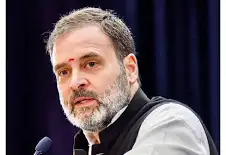Rahul Gandhi, the prominent leader of the Indian National Congress, has found himself at the center of a legal storm concerning the question of his citizenship. The issue stems from allegations that Gandhi may have held British citizenship in the early 2000s, potentially violating Indian laws that prohibit dual citizenship. The case has drawn significant attention, with petitions filed in both the Allahabad and Delhi High Courts. If these allegations are proven in court, Gandhi’s Indian citizenship could be at risk under the provisions of the Indian Citizenship Act, 1955, and Article 9 of the Constitution of India.
How Provision of Indian Citizenship Act, 1955 affect Rahul Gandhi
The Citizenship Act, 1955 outlines the provisions under which Indian citizenship can be acquired, lost, or terminated.
Two key sections of this Act—Section 9 (Termination of Citizenship) and Section 10 (Deprivation of Citizenship)—are particularly relevant in this context.
Section 9: Termination of Citizenship
Section 9 of the Citizenship Act deals with the automatic termination of Indian citizenship if a person voluntarily acquires the citizenship of another country. This is a clear provision to prevent dual citizenship. If Rahul Gandhi is found to have voluntarily acquired British citizenship, his Indian citizenship would automatically terminate.
The Supreme Court’s ruling in Government of Andhra Pradesh v. Mohd. Khan (2004) upheld this provision, stating that acquiring foreign citizenship voluntarily results in the termination of Indian citizenship. Thus, if it is established that Gandhi held a British passport, his Indian citizenship would be nullified under Section 9.
Section 10: Deprivation of Citizenship
While Section 9 concerns the automatic termination of citizenship, Section 10 allows for the deprivation of citizenship in specific cases, such as disloyalty to the Indian Constitution, engaging in illegal activities, or acquiring citizenship through fraudulent means. If it is proven that Gandhi’s acquisition of British citizenship was fraudulent or in violation of Indian laws, he could face a formal deprivation of his citizenship under Section 10.
The case of Bhagwati Prasad Dixit Ghorewala v. Rajiv Gandhi (1986) illustrated that acquiring a foreign citizenship voluntarily would preclude an individual from enjoying the rights and privileges of Indian citizenship. This case reinforces the notion that Indian citizenship, once lost, cannot be reinstated unless the individual follows due legal procedures.
Article 9 of the Constitution of India
Article 9 of the Constitution of India further strengthens the legal framework against dual citizenship. It states:
“No person shall be a citizen of India or be deemed to be a citizen of India if he has voluntarily acquired the citizenship of any foreign State.”
This provision is the constitutional underpinning of Section 9 of the Citizenship Act. Article 9 makes it clear that an individual cannot hold Indian citizenship if they voluntarily acquire another nation’s citizenship. The core issue in Rahul Gandhi’s case revolves around the allegation that he may have held British citizenship during his association with the UK-based company, Backops Limited. If this claim is proven, it would directly violate Article 9, leading to the automatic revocation of his Indian citizenship.
The Allegations and Legal Proceedings

The legal controversy gained momentum with a Public Interest Litigation (PIL) filed in the Allahabad High Court by Vignesh Shishir, a BJP member, in which he claims that Rahul Gandhi held British citizenship. The petition refers to evidence suggesting that Gandhi was listed as a British citizen in the official records of Backops Limited, a company he was associated with in the UK during the early 2000s.
The Delhi High Court is also hearing a related case filed by Subramanian Swamy, another BJP leader, who alleges that Gandhi’s actions amount to a violation of Article 9 of the Constitution. Swamy has sought a direction for the government to investigate the issue and determine whether Gandhi’s Indian citizenship was forfeited due to his foreign nationality. The Central Bureau of Investigation (CBI) is currently investigating the claims, which adds a layer of complexity to the case.
If the allegations of dual citizenship are substantiated, both the Allahabad and Delhi High Courts could order a legal review of Gandhi’s citizenship status. The CBI’s involvement in the matter suggests that the Indian government may take action based on its findings.
What Happens If Rahul Gandhi’s Citizenship is Revoked?
If the courts determine that Rahul Gandhi voluntarily acquired British citizenship, the consequences would be far-reaching. According to Section 9 of the Citizenship Act, his Indian citizenship would be automatically terminated. This could have significant legal and political ramifications.
- Loss of Political Rights: As an Indian citizen, Rahul Gandhi holds the right to vote, contest elections, and engage in political activities. If his citizenship is revoked, he would lose these rights. This could prevent him from running for public office or participating in the political process in India.
- Legal Implications: Revocation of citizenship could also result in Gandhi losing his legal standing in India. He may no longer be entitled to legal protections reserved for Indian citizens, which could affect his ability to contest cases or claim any constitutional rights in the country.
- Impact on Public Perception: Politically, the revocation of Rahul Gandhi’s citizenship could lead to a significant loss of credibility and public trust. It would fuel opposition claims that Gandhi violated the law, undermining his standing as a national leader.
Rahul Gandhi’s citizenship status is indeed in serious jeopardy if the allegations of dual citizenship are proven in court. Both the Citizenship Act, 1955 and Article 9 of the Constitution of India provide clear legal grounds for the termination of Indian citizenship if an individual voluntarily acquires the citizenship of another country. Given the ongoing legal proceedings in both the Allahabad and Delhi High Courts, the outcome will likely have significant consequences for Gandhi’s political and legal future. If the charges are substantiated, the result could be the loss of his Indian citizenship, altering his role in India’s political landscape.
Bottom of Form
.






